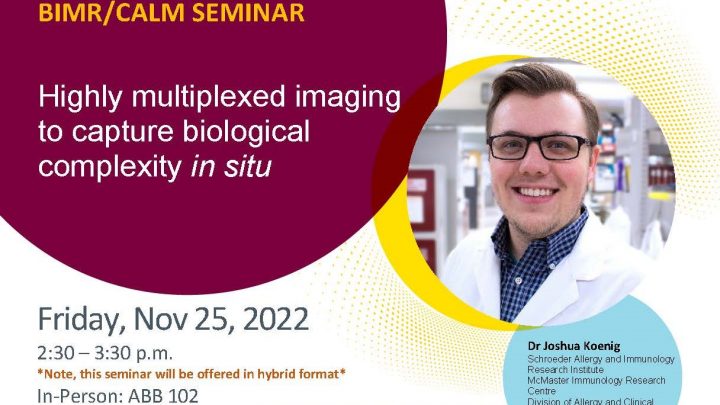Highly multiplexed imaging to capture biological complexity in situ
Nov 25, 2022
2:30PM to 3:30PM

Date/Time
Date(s) - 25/11/2022
2:30 pm - 3:30 pm
Categories
Dr Joshua Koenig
Schroeder Allergy and Immunology Research Institute
McMaster Immunology Research Centre
Division of Allergy and Clinical Immunology
Department of Medicine
Immune cells are characterized based on the expression of the surface protein markers which define their function. Current high-dimension techniques like single cell RNA sequencing have revealed extensive heterogeneity among immune cells; a complexity often requiring >10 markers to classify the sub-populations within any given cell type. Imaging the localization and interactions of these immune sub-populations in situ is difficult as typical fluorescent microscopy workflows only allow for 4-6 markers to be evaluated simultaneously. To address this gap, we are applying an open-source iterative imaging workflow called IBEX (Iterative Bleaching Extends multipleXity) which in practice has allowed for >60 markers to be analyzed on the same tissue section, but in theory could be scaled into the hundreds. This workflow involves inactivating fluorophore labels and labelling additional targets using the same set of fluorophores. The application of IBEX to biological samples allows for discovery imaging approaches to identify new interactions between exquisitely defined subpopulations of cells.
Bio:
Josh received his undergraduate degree from the Bachelor of Health Sciences program at McMaster University in 2015. He entered the Master’s of Medical Sciences program under the supervision of Dr. Jordana and transferred into the PhD program in January 2017. His project focuses on the generation of high avidity IgE antibodies in food allergy. Josh’s graduate research is made possible through the scholarships: Ontario Graduate Scholarship-PhD and the Eva Eugenia Lillian Cope Scholarship.
Join Zoom Meeting
https://mcmaster.zoom.us/j/91032431648?pwd=ajQ0U2NwYjFsTlVBNDFnWWF4MktCQT09

